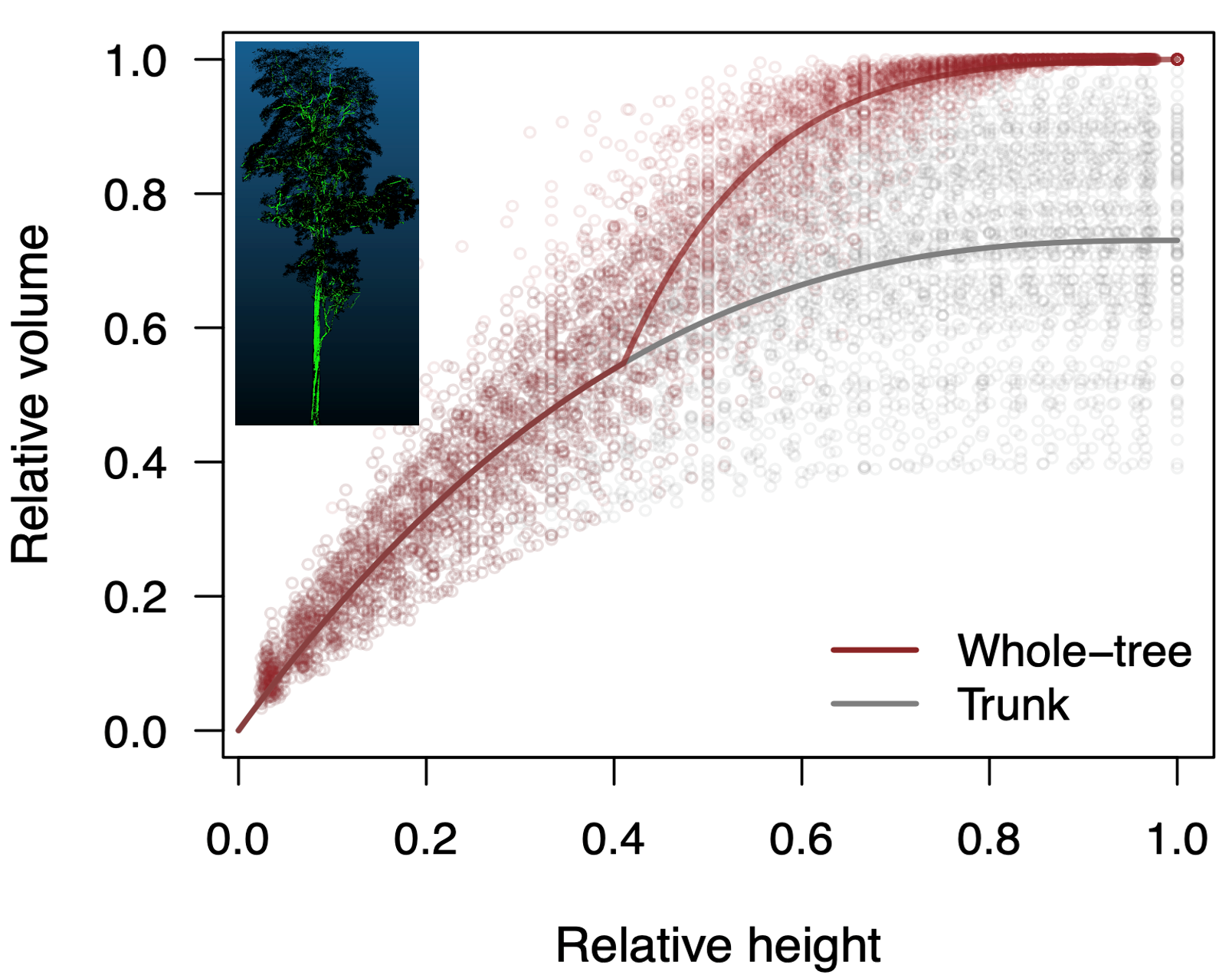March 15, 2022
Modeling Tropical Tree Volume to Estimate Crown Damage
Researchers measured tree trunk and crown vertical profiles to describe the volume contained up to any height in tropical trees.

Cumulative volume profile models for 177 trees (49 species) in a lowland tropical forest in the Barro Colorado Island, Panamá. Points correspond to volumes accumulated up to the given heights in trunks (red) and whole trees (grey).
[Reprinted with permission from Zuleta, D., et al. “Vertical Distribution of Trunk and Crown Volume in Tropical Trees.” Forest Ecology and Management 508, 120056 (2022). [DOI: 10.1016/j.foreco.2022.120056] © 2022 Elsevier.]
The Science
As the climate changes, monitoring tropical forest health is crucial. Tree-level damage (i.e., branch fall, trunk breakage, and decay caused by wood decomposition in standing trees) is one of the most important factors preceding tropical tree deaths. However, field-based damage assessments are very limited, in part due to the lack of whole-tree (trunk + branches) volume equations in tropical trees. Using terrestrial laser scanning, forest ecologists with the Next Generation Ecosystem Experiment–Tropics (NGEE–Tropics) studied the vertical distribution of trunk and crown (i.e., branches) volumes to provide models to estimate the proportion of volume contained up to any height in tropical trees.
The Impact
Field-based assessments of tree damage are increasingly needed to better estimate biomass losses and drivers of tree mortality. This research provides a set of models that can be used to estimate volume losses in living trees when the living length of the trunk and the proportion of newly broken branches are available.
Summary
Tree volume models are critical for forest management and for obtaining accurate forest carbon estimates. In this paper, researchers present species-composite cumulative volume profile models that describe the volume contained up to a given height in the trunks and crowns of tropical trees. They used terrestrial laser scanning (TLS) and quantitative structure models to estimate the trunk and crown volume of 177 trees (49 species) in a lowland tropical forest in the Barro Colorado Island in Panamá. The researchers found that (1) the rate at which volume accumulated with height was much higher and variable in the whole tree (trunk + branches) than only in the trunk; (2) the variability in the rate of volume accumulation was three times higher in the trunk and nine times higher in the whole tree across individuals within species than between species; and (3) the parameters describing the rate of volume accumulation significantly depended on the height of attachment of the lowest branch, but not on the tree size.
Principal Investigator
Daniel Zuleta
Smithsonian Tropical Research Institute
[email protected]
Program Manager
Brian Benscoter
U.S. Department of Energy, Biological and Environmental Research (SC-33)
Environmental System Science
[email protected]
Funding
This project was supported as part of the Next Generation Ecosystem Experiments–Tropics (NGEE–Tropics) and was funded by the Biological and Environmental Research (BER) Program within the U.S. Department of Energy’s (DOE) Office of Science. Data collection was supported by the Forest Global Earth Observatory (ForestGEO) of the Smithsonian Institution.
References
Zuleta, D., et al. "Vertical Distribution of Trunk and Crown Volume in Tropical Trees." Forest Ecology and Management 508 120056 (2022). https://doi.org/10.1016/j.foreco.2022.120056.

